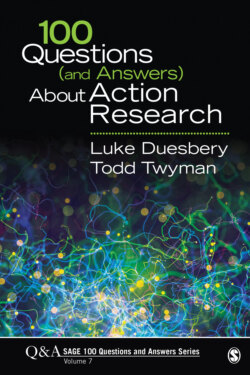Читать книгу 100 Questions (and Answers) About Action Research - Luke Duesbery - Страница 19
На сайте Литреса книга снята с продажи.
Question 10 Why Is Knowing Yourself Important While Doing Action Research?
ОглавлениеYou come to your graduate program or workplace with preconceptions about how the world works and your place in it. So, it’s critical to understand facts and ideas in the context of a conceptual framework and organize knowledge in ways that facilitate retrieval and action. Self-reflection in action research can help you learn to take control of your own learning.
Action research settings are complicated, and engaging in action research happens within a shared environment. Cognitive anthropologists Jean Lave and Etienne Wenger (1991) refer to this as a community of practice, where people come together with common interests and goals to improve their situation. However, the notion of “common” is up to the individual and can at times be in conflict with others in that community. So, knowing yourself and your place in that shared environment can impact the success or failure of achieving a particular goal.
If we agree that knowledge is best gained through multiple voices and perspectives, then we must also recognize the strength of identity development in the context of diversity and equity, as part and parcel to examining problems of practice. Action research is particularly powerful in supporting our learning, negotiating, and (re)interpreting the often-conflicting conversations that are situated in and among places of power.
The term reflexivity is often used in action research. It is found in several fields, such as adult learning, work-based practice, and more specifically, qualitative research based on the 1970s works of Argyris and Schön. Reflexivity happens when we acknowledge that our history and identity impact our research. With respect to action research, reflexivity refers to our self-awareness in the sense that when we conduct an action research project, we are more concerned with seeing our truth as it relates to our place in the world. We aren’t necessarily concerned that our action research findings generalize to the greater world, but how our results impact the work we do, how we are transformed by them, and how our research benefits all stakeholders.
Here’s why it’s important: When we acknowledge that our participation in action research is subjective by nature, we can work to know our social world more effectively. For example, we assume many things are “normal” or “common sense.” However, normality is in the eye of the beholder. In other words, normal might be being straight, white, and male. Of course, this shouldn’t be the case, but it often is. Once we examine that these are actually potential biases, we can begin to work toward a more equitable and ethical framework to minimize power dynamics that exist (teacher to student, doctor to patient, manager to employee).
More questions? See questions 21 and 22.
